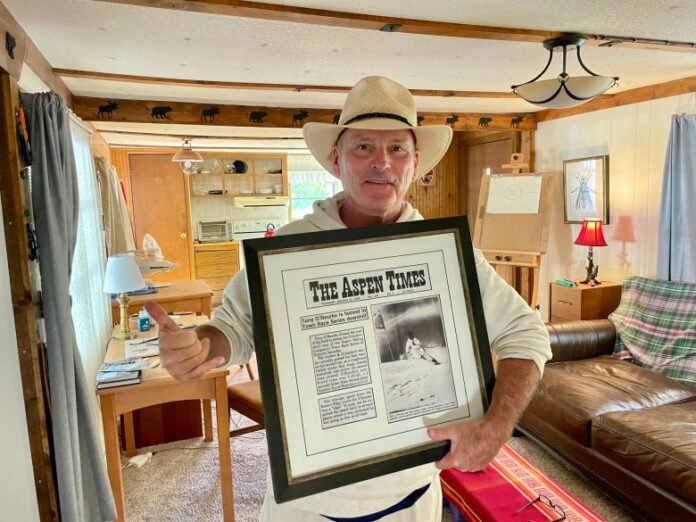DESCRIPTION: Residents of 3-Mile Mobile Home Park will go before Garfield County commissioners on Monday to ask them to sign up to receive state Proposition 123 funds for affordable housing before the Nov. 1 deadline.
By Eleanor Bennett
For Aspen Journalism and Aspen Public Radio
Residents of the 3-Mile Mobile Home Park in the Glenwood Springs area will go before Garfield County commissioners Monday to ask them to sign up to receive special state funds for affordable housing before the Nov. 1 deadline.
Proposition 123, which was passed by Colorado voters in 2022, reallocates money already collected through the state income tax to affordable housing. The legislation created the State Affordable Housing Fund, administered by the Department of Local Affairs (DOLA) and the Colorado Office of Economic Development and International Trade (OEDIT).
The park’s residents want to apply for Proposition 123 funds to help them take ownership of their park from local social justice nonprofit MANAUS and its subsidiary, the Roaring Fork Community Development Corporation (Roaring Fork CDC). The Roaring Fork CDC struck a deal to purchase the park from its longtime private owners in late 2022 and closed on the sale the following spring, with the intention of transferring ownership to the park’s residents.
The transition process to a resident-owned park has been underway for several years and 3 Mile resident Tony O’Rourke, who first moved to the valley in 1979, said the money would help them in the final stretch can help.
“If someone else buys this park, they’ll kick everyone out, and you’ll lose another 30 to 40 people doing the menial work in the valley,” O’Rourke said. “We’re the ones who work in the restaurants, mow your lawns, you know, wash the dishes in Aspen.”
Credit: Eleanor Bennett / Aspen Journalism and Aspen Public Radio
Proposition 123 funds are only available to local governments, including towns and counties, that have signed up for the program, and Garfield County is one of 21 of the state’s 64 counties that have not signed up, although all six of the communities from Carbondale to Parachute have signed on.
3-Mile Mobile Home Park has an address in Glenwood Springs, but the park is technically in the unincorporated part of the county, meaning residents can only apply for state funding if the commissioners agree to apply.
To participate, unincorporated Garfield County would have to agree to expand its affordable housing stock by 3% each year and create an expedited approval process for such projects. Projects led by outside entities such as private developers and nonprofits would count toward the count, and the only penalty for not reaching the 3% threshold is that the county would once again be unable to use the funds.
While compliance with these provisions may be seen as unlikely for three county commissioners who have often expressed skepticism about publicly funded affordable housing projects, Commissioner Tom Jankovsky said he is open to the idea and hopes they can reach a decision at Monday’s meeting to take.
“I don’t know why we wouldn’t support it [Proposition] 123 I think affordable housing and low-income housing is one way to achieve that,” Jankovsly said. “As long as there is no budget risk for us and the state does not interfere with our planning and zoning, I do not see any downside.”
Last year, Gail Schwartz, president of Habitat for Humanity of the Roaring Fork Valley, approached the commissioners about joining the state program to help finance a proposed land bank project. But Schwartz said Habitat decided not to make an official request after hearing from county officials that its efforts were unlikely to be successful.
“What we’re missing out on is our share of access to these sovereign wealth funds that we already contribute to,” Schwartz said. “It is difficult for us in rural communities to access funding, but if we can get the resources from Proposition 123, we can help the county meet its housing needs.”
If commissioners approve the state program, 3-Mile residents could qualify for a range of financing options, from infrastructure work to land acquisition and money set aside specifically for mobile home parks.
“What is most important to us and the residents at this time is that infrastructure is being worked on, but there is also additional financing available for purchases and other opportunities to ideally help reduce the initial purchase costs for the residents,” said Andy Kadlec , chairman of the board of directors. from Roaring Fork CDC.

As part of their submission for consideration by the county commissioners, 3-Mile residents included a petition, which as of Thursday had more than 70 signatures from other community members.
“If the county signs on to Proposition 123, it will impact so many more projects and so many more community members than just the residents of 3-Mile Park. This really opens the door to any affordable housing development,” Kadlec said.
If Garfield County commissioners decide not to apply by the Nov. 1 deadline, the county will not be eligible to participate in the program again until next fall.
But for O’Rourke and his fellow residents of the 3-Mile Mobile Home Park, another year feels too long to wait to preserve essential worker housing.
“The working class is under threat in this valley, and in fact in every mountain town in Colorado and beyond,” O’Rourke said. “So you’re sterilizing certain parts of the high Rocky Mountains, and it breaks my heart.”
This story was produced through a social justice partnership between Aspen Journalism and Aspen Public Radio.





